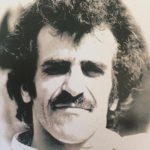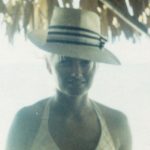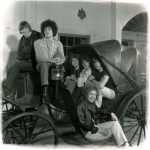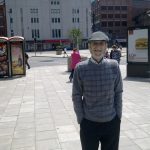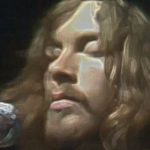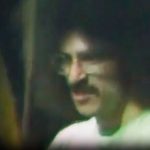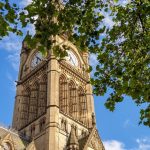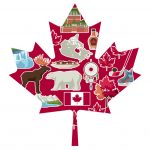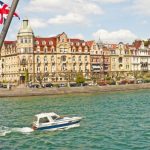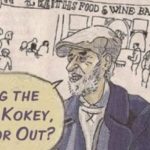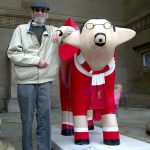DAVID WELLS’ SLEEVE NOTES FOR FORTHCOMING CD RE-ISSUE
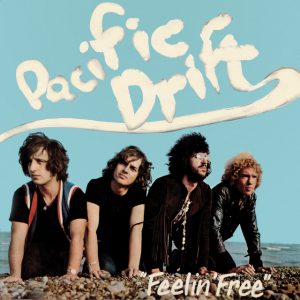 Released to widespread indifference back in January 1970, Manchester band Pacific Drift’s album Feelin’ Free surely deserved a better fate. A sparkling, West Coast-influenced amalgam of post-psychedelic pop and early progressive rock, skilfully weaving wistful hippie laments and riff-laden rockers into a fully cohesive whole, it didn’t really attract any kind of attention until the Great Prog Rock Stampede of the late Eighties, when albums that couldn’t be given away when first released suddenly began to change hands for significant sums of money.
Released to widespread indifference back in January 1970, Manchester band Pacific Drift’s album Feelin’ Free surely deserved a better fate. A sparkling, West Coast-influenced amalgam of post-psychedelic pop and early progressive rock, skilfully weaving wistful hippie laments and riff-laden rockers into a fully cohesive whole, it didn’t really attract any kind of attention until the Great Prog Rock Stampede of the late Eighties, when albums that couldn’t be given away when first released suddenly began to change hands for significant sums of money.
This first-ever authorised reissue of what has become a highly sought-after album adds three tracks from the variant US release as well as the band’s version of the Spirit song ‘Water Woman’, only released at the time as a UK single. With rare photos, new band quotes and master-tape sound quality, this long-overdue release is unquestionably the definitive Pacific Drift anthology.
Though their sole album wouldn’t emerge until the dawn of the Seventies, Pacific Drift had been around for some while by that point. A product of the highly incestuous Manchester group scene of the mid-to-late Sixties, they had first come together in 1967 as the Sponge – essentially an updated, psychedelic-era version of the Tony Merrick Scene, with singer Merrick and guitarist Graham Harrop involved alongside other musicians, including an Asian drummer. But there were several early personnel changes, culminating with Merrick leaving in early 1968 to form a new Manchester ‘supergroup’, Sweet Marriage.
By that summer, the Sponge comprised Harrop, singer and lead guitarist Barry ‘Taz’ Reynolds (who’d spent the first half of 1968 in the Measles, having previously played with a late-period line-up of Ivan’s Meads), former Blue Angels organist Brian Chapman, sax/flute player Jack Lancaster, bassist Pete Gray and drummer Lawrence Arends. Previously with freakbeat legends Wimple Winch, Arends (later to change his name to Larry King after his surname was misspelt as Arendes one too many times) had been the last to join. “They heard that I was available, and asked me to try out a few numbers with them at a rehearsal room. They liked what they heard, and persuaded me to become a permanent member. What struck me right away was the combined sound of Barry Reynolds’ excellent lead work, Brian Chapman’s Hammond organ sound and Jack’s skills with sax and flute. Also, their attitude was musically sharp, and although we were doing mostly covers, you could tell they had a lot of musical ideas of their own. I soon settled in…”
Under the management of leading Manchester agents Kennedy Street Enterprises, the Sponge became a popular draw on the thriving North-West gig circuit. However, at the end of 1968 they lost both Pete Gray and Jack Lancaster, with the latter joining Jethro Tull spin-off Blodwyn Pig (whose leader, Mick Abrahams, was well known on the Manchester group scene, having been a member of a late version of the Toggery Five). Losing the prodigiously talented Lancaster must have been a body blow, but the Sponge opted to continue as a quartet, with Graham Harrop taking on bass chores. This line-up briefly became the backing band for fellow Kennedy Street act Dave Berry (a role that had previously gone to the Richard Kent Style). In addition to playing gigs with Berry, the group performed on the singer’s April 1969 single, ‘Huma Luma’, which was duly credited to Dave Berry & the Sponge.
Berry’s lacklustre cover of one of John Carter’s lesser songs didn’t restore him to the charts, but by the time it came out, the Sponge were concentrating on their own career. Kennedy Street, who were hopeful of securing a major label recording deal for the group, regularly sent their acts over to the Bahamas to play a residency at the Jokers Wild club. The Sponge were duly offered a six-week stint at the club, thus affording them the ideal opportunity to make a few quid, enjoy a holiday in the sun, hone their musical tightness and also work on new material. Naturally they jumped at the chance. However, Lancaster’s departure had left them a bit light, and it was decided that they needed to recruit a fifth member. Enter David Bowker, who’d done time with a plethora of Manchester bands, including Ivan’s Meads and the Richard Kent Style.
“Sax man Jack Lancaster had left to join Blodwyn Pig”, he recalls, “and I was asked if I would be interested in a gig in the Bahamas, doubling on bass and sax, and recording an album for Deram when we got back. I thought about it for a nanosecond, then said yes! Within days I was on a plane to Freeport on Grand Bahama Island for two months of sun, sea, sex and ego-tripping. It was May 1969. After a short stop in Bermuda we landed in Freeport, where we started shagging almost as we got off the plane. It was outrageous; we all were. Our behaviour was, to say, the least, unsavoury. Drinking was the main problem – we discovered a cocktail called a Zombie, which is what it literally turned you into…”
Thousands of miles away from home on an island paradise, the Sponge were determined to let their hair down. David Bowker: “Our stage antics were outrageous… One night I fell and ripped my velvet bellbottoms from the arse to the fly-hole. They were that tight that I was wearing no underwear, so I was kneeling onstage playing bass with my knob exposed to the audience! I heard a crash from behind me. Drummer Larry was laughing so hard he had fallen off his drum stool – legs in the air was all I could see! I rushed offstage and changed into my jeans pretty sharpish.”
“What with the sun, sand, sex, wacky baccy, Purple Haze and long nights at the Jokers Wild, the Bahamas gig was an amazing experience”, agrees Larry Arends. “Sometimes we would finish about 3 or 4 a.m., and I remember walking back to the apartments where we were staying on an unlit road with just the moonlight and thousands of fire-flies winking on and off all the way back. Some mornings after a tropical downpour, all these giant toads would be everywhere, making a hell of a racket. One time our car was full of the blighters. The Bahamas were relatively undeveloped back then, but American cruise ships would call at the port for weekend stopovers, and these would make up the bulk of customers we were playing to, alongside passengers and crew of the 707s that frequently landed bringing sun-seekers from all over the US.”
The Sponge’s hectic workload at Jokers Wild saw them become a tight little unit, as Larry – who’d forged a writing partnership with Barry Reynolds – explains. “The nights were long and frenetic, with us having to play five forty-five minute spots as the house band with a thirty minute break in between. It was during these marathon nights that the band formed a new identity for itself – it certainly made me a better drummer as it helped the rest of the band improve their skills. I also found a new range of lyric writing coming to me.”
The Sponge returned to England in July 1969, although the suggestion that David Bowker would become a permanent member was quietly forgotten (“Offstage things were not so good – I did not get along with any of the guys”, he now admits). Their return to Manchester had been necessitated by Decca’s offer of a recording test. Larry: “Our manager, John Rubin, had phoned to tell us that that he had arranged an audition with Decca when we completed our contract. The problem was that we had to go back to the UK. After enjoying the beautiful weather, fabulous deserted beaches, our own Caddy convertible to get around in, roomy furnished apartments at the Robin Hood complex, it was tough to tear ourselves away. Coming back to England was one of the hardest decisions I have ever had to make, but we were a democracy, and with a record deal in the offing, we voted to return – although we had offers of work beyond our original two-month contract, and even now I often wonder how things might have turned had we stayed there. But still, the chance of a record deal was too good to miss, so we reluctantly packed our bags and flew back to a cold, wet and miserable Manchester to rehearse some of our own material that had been inspired by our recent Bahamian adventure… Now back to a four-piece, we duly sailed through the audition at Decca’s studio in London to begin work on a single and album.”
With Decca/Deram serendipitously about to launch a new ‘underground’ label, Nova, Kennedy Street had managed to persuade the company to offer album deals to a number of their more esoteric acts (others included fellow Jokers Wild visitors the Elastic Band and a Leeds-based hippie folk duo by the name of Jan Dukes De Grey). The band were placed with Deram producer and head of A&R Wayne Bickerton (who also handled the likes of Timebox, Toby Twirl, the World of Oz and pre-King Crimson act Giles, Giles and Fripp), and work duly began on the album, with the band spending a week at Regent Sound (just off Oxford Street), recording the songs on newly-installed eight-track equipment. It was at some point during sessions that the Sponge decided the time was right for a change of name, with their Bahamas jaunt providing the inspiration for their new moniker – Pacific Drift.
Famed session singers Sue & Sunny helped out on backing vocals, most notably on the album’s only non-band composition, ‘Just Another Girl’, which had been written by the mysterious Andrew Matus. “That was a nom de plume for Wayne Bickerton and his associate, who had written hits for other artistes”, reveals Larry. “It was a condition of the deal that we recorded ‘Just Another Girl’, which featured Barry Reynolds playing violin, and included it on the album. At first Deram had planned to release it as a single, but they changed their minds when they heard our version of ‘Water Woman’. When we played ‘Just Another Girl’ on stage, it was twice as long, but we pruned it down in the studio so that it would be suitable for a single. It was also suggested that ‘Just Another Girl’ could be an entry for the Eurovision Song Contest, but this idea didn’t go anywhere. I can’t say I was too unhappy about that!”
Issued in January 1970 in a suitably evocative sleeve design (“the photos were taken on Shoeburyness beach on the SE coast, Decca choosing these from a selection we did during a one-day shoot”, recalls Larry), Feelin’ Free didn’t attract a great deal of attention at the time, and it remains one of the lost nuggets of the progressive pop era. Bearing a strong West Coast influence, the album was effectively split between the cerebral and the visceral. In the latter category, ‘Just Another Girl’ and ‘Plaster Casters USA’ (a paean to the gaggle of LA groupies who immortalised their rock star conquests by making plaster casts of their appendages – appropriately, Brian Chapman’s ever-swelling organ was a highlight of the track!) were commercial, riff-laden rockers, typical late Sixties underground rock that still retained a pop sensibility (only two of the eleven tracks stretched more than a few seconds beyond the three-minute barrier).
The delicate, harpsichord-laden ballad ‘Tomorrow Morning Brings’ was probably the pick of the more wistful material, but it had plenty of competition. The laid-back, summery vibe of ‘God Has Given Me’ was a fine slice of Age of Aquarius post-psychedelic pop, as was ‘Norman’, a playful vignette that mentioned Middleton Towers (a Pontin’s holiday camp near Morecambe – a popular destination at the time for holidaying Mancunians) and which saw Jack Lancaster supplying some atmospheric flute. Lancaster was also given a writing credit for both ‘Garden Of Love’ (actually an adaptation of a poem by an uncredited William Blake) and ‘Grain Of Sand’ – which, again, was inspired by a Blake poem, ‘Auguries Of Innocence’ (“to see a world in a grain of sand, and heaven in a wild flower”).
Elsewhere, the catchy title track featured a fine, Brian Auger-style organ break from the impressive Brian Chapman, the soulful ‘Going Slow’ boasted some fine vocal harmonies (another feature of the album), while ‘Greta The Legend’, featuring a striking guitar solo from Barry Reynolds, suggested that, had they stayed together, the band might have gone on to pursue a slightly heavier direction. Possibly the most impressive track, though, was the big finale number, ‘Happy Days’, a slow-burning, West Coast-inspired beauty that featured the Dave Davani brass section (as did ‘Norman’) and a lyric that was clearly inspired by the band’s idyllic Bahamas sojourn.
Feelin’ Free received a largely favourable press. “A four-piece group with a sound somewhere between the Small Faces and Jethro Tull”, was Disc & Music Echo’s slightly perplexing summary, while Melody Maker noted that “Competent musicians, reasonable vocals and excellent original material lift this out of the general rut”. But it was the monthly magazine Beat Instrumental who captured the album’s qualities most adroitly. “Combining the elements of commercial music with those of so-called progressive music is an extremely difficult goal to achieve”, they observed. “That Pacific Drift seem to have succeeded in this respect, without sacrificing quality, can only be to their credit… Definitely a first-class album.”
Deram Nova duly set to work promoting the album. In addition to including ‘Just Another Girl’ on the literally-titled label sampler LP Nova Sampler, the label issued a press ad that featured a single sentence summary of their various inaugural releases, with Pacific Drift précised as “All the material on the album is their own – they welcome honesty and freedom in music, but haven’t forgotten melody”. The label also publicised Feelin’ Free (and those by their other acts) with ‘Nova nights’ up and down the country, with Pacific Drift sharing the bill with the likes of Egg, Galliard and Clark-Hutchinson. “We did some great gigs after the album was released, playing festivals, clubs and assorted venues across the UK and Europe”, says Larry. “One tour even saw a selection of ourselves, Galliard, Clark-Hutchinson and other Nova artistes being flown out to Zaire (formerly the Belgian Congo) on two chartered 707s along with our gear for a three-week tour of the country. However, we only managed a few gigs in and around Kinshasa before civil unrest forced President Mobutu to cut short the tour, and we were all given an armed protective escort out of the country and flown back to the UK.”
Such experiences gave the band plenty of inspiration for new material, but Feelin’ Free had quickly found its way into the bargain bins, and Decca denied them the chance to record a second album. Nevertheless, they did record some new material in early May 1970, from which the stand-alone single ‘Water Woman’ b/w ‘Yes You Do’ was issued in the UK by Deram the following month. The A-side was a convincing version of a track from the debut Spirit album (a popular choice of cover amongst British bands of the era, ‘Water Woman’ had also been recorded by fellow Decca act the Amazing Friendly Apple and York baroque poppers Angel Pavement). Like the album, though, ‘Water Woman’ failed to make a mark despite the band promoting its release with gigs at the Marquee (on the same bill as Arthur Brown) and hip London club Blaise’s.
The UK appearance of ‘Water Woman’ coincided with the belated US issue of Feelin’ Free, albeit in a marginally different sleeve design and with a different track selection and running order. Out went ‘Going Slow’ and ‘God Has Given Me’, and in came three new songs from those May sessions – ‘We’re On Our Way’, ‘Don’t Turn Away’ and ‘Yes You Do’, with the last-named also appearing in the US as the B-side of ‘Tomorrow Morning Brings’.
But the American releases fared no better than their UK counterparts, and by the time that Pacific Drift paid a return visit to the Marquee in mid-September 1970, the writing was on the wall. When Barry Reynolds (who, in addition to releasing a 1982 solo album, I Scare Myself, would act as Marianne Faithfull’s musical director for many years as well as working with the likes of Grace Jones, Joe Cocker and John Martyn) quit in late September to link up again with Jack Lancaster in Blodwyn Pig, Pacific Drift duly imploded. Brian Chapman hooked up with Chicken Shack, Graham Harrap reunited with a couple of his old Toggery Five colleagues in Young & Renshaw, and Larry Arends left the full-time music scene to move into photography. It was a low-key end to a band that, as can be heard on this definitive Pacific Drift anthology, had briefly promised so much. “I always felt the band had great potential”, claims Larry. “We would have gone on to produce much more focused and specialised material, as all the members were full of creative and original ideas. Unfortunately, these ideas weren’t allowed to come to fruition. We had hoped to follow up Feelin’ Free, but Decca never gave us the chance to do so…”
DAVID WELLS
June 2009
With thanks to Larry King (https://www.pacificdrift.co.uk) and David Bowker (http://www.davidbooker.com)
PACIFIC DRIFT Feelin’ Free
- Plaster Casters USA (Reynolds/Arends)
- Tomorrow Morning Brings (Harrop/Chapman/Reynolds)
- Feelin’ Free (Reynolds/Arends)
- Just Another Girl (Matus)
- Garden Of Love (Lancaster/Reynolds)
- Norman (Harrop/Chapman/Arends/Neale/Reynolds)
- Grain Of Sand (Lancaster/Reynolds)
- Greta The Legend (Reynolds)
- Going Slow (Reynolds/Arends)
- God Has Given Me (Reynolds/Arends)
- Happy Days (Arends/Reynolds)
- Yes You Do (Reynolds)
- We’re On Our Way (Reynolds/Arends)
- Don’t Turn Away (Reynolds/Arends)
- Water Woman (Ferguson)
1-11 The UK album Feelin’ Free, Deram Nova SND 13, released January 1970
12-14 Additional tracks from the US version of Feelin’ Free, Deram DES 18040, released June 1970
15 A-side of Deram DM 304, released June 1970
Barry Reynolds – lead vocal, lead guitar, acoustic guitar, bass
Brian Chapman – piano, organ, harpsichord, vocals
Lawrence Arends – drums, L.A. percussion, vocals
Graham Harrop – bass, acoustic guitar, vocals
Friends of Pacific Drift
Jack Lancaster – flute
Clive Neale – co-writer ‘Norman’
Thanks to the Dave Davani brass section and Sue and Sunny
Hilda Gronk – 3 Ironside Villas, Scunthorpe
Producer – Wayne Bickerton
Arranged by Wayne Bickerton and Pacific Drift
Recording engineer: R. Wilkinson
Master tape mix: Bill Price
leeve photography: David Wedgbury
(Publishing details to be added when notified by MCPS/PRS)
This release issued under licence from Universal Music Operations Ltd
Compiled and annotated by David Wells
Co-ordinated by Steve Hammonds and David Wells
Mastered by Andy Pearce at Masterpiece
Design & Artwork by Andy Morten for Pepperbox
Original sleevenote
Simple, Effective and Genuine, these are the three most important words in music today, and so they should be! For far too long it has been subject to gimmickry of all kinds, and it relieves us to see so many people listening more to the music itself and not the effects of some new electronic device. We have tried to keep everything here as simple, effective and genuine as possible, and there’s nothing contrived or false on any of these tracks. It has more of a team effort than anything else, and a lot of credit must go to John Rubin and Wayne Bickerton, for without whose help this album would not have been possible.
release © 2009 Grapefruit, a division of Cherry Red Records Ltd
Licensed from Universal Music Operations Ltd
Write for full Cherry Red and associated labels catalogue to: Cherry Red Records, 3a Long Island House, Warple Way, London W3 0RG, United Kingdom.
Manufactured in EC/MCPS
GRAPEFRUIT CRSEG005
